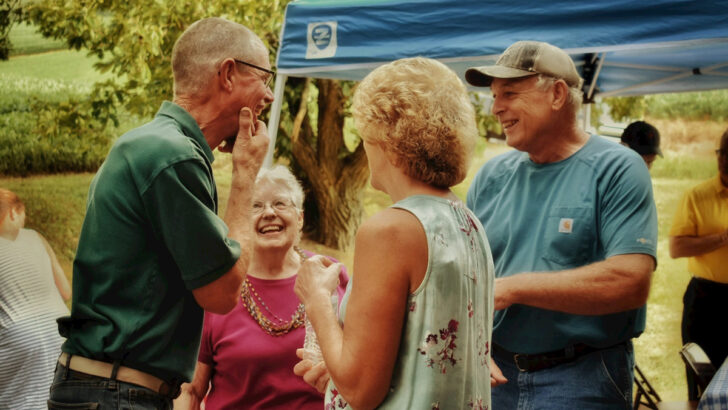Sidewalk chalk, that staple of summer, is easy to spot on an early morning walk. You may be tempted to start skipping over the loosely drawn squares of some little person’s hopscotch course. Or, since this chalk often comes in pastel hues, it’s hard to create a convincing Elmo, but an artist has given it her best shot.
You smile when you walk by a house with colourful sidewalks.
But what about the neighbour’s sidewalks? My granddaughter is a chalk artist, and her creations spilled over to the pathway of the lady next door. My daughter apologised to the homeowner and told her they would be more careful about boundaries.
“Oh, no,” replied her neighbour, who is old enough to be a grandma. “She can draw all she wants on my sidewalk.”
Recounted
Then she recounted a tale from her youth. This woman recalled her own artwork venturing on to the pavement of her next-door neighbour. After these many years, the woman still remembers the scolding she received from that neighbour, the reprimand, the harsh instructions to clean off the sidewalk.
It made such an impression on her that after all these years she wants to make her sidewalks welcoming.
What memories do you want to leave with the people you encounter? What recollections would you like to remain with a child 50 years from now?
We live in angry times. The political discussions are more acrimonious than anything I can remember in my lifetime, and even within the Church the disagreements become disrespectful and rude.
When I see the bitter, insulting words slung about, the name calling, I remember the election of 2008 and a rally held for Sen. John McCain, the Republican nominee for president. You can easily search for this encounter on YouTube.
He’s a decent family man, citizen, that I just happen to have disagreements with on fundamental issues”
McCain was making his case for why he would be a better president than the Democratic nominee, then-Sen. Barack Obama of Illinois.
But during the question-and-answer period, McCain fielded a question from a woman who said she doesn’t trust Obama. Then she referred to him as an ‘Arab’.
At that, McCain, who had been listening and nodding, took the microphone from her hands.
“No, ma’am, no,” he says emphatically. “He’s a decent family man, citizen, that I just happen to have disagreements with on fundamental issues.”
I was not in agreement with McCain on many of those issues, but I always retain that memory of him in that room that night. A good, brave man who was willing to fight for his principles, but not willing to wallow in the dirt of false accusations. His own decency insisted that he acknowledge the decency of his opponent.
When did our political discourse change?
Leap
It may seem a leap from a sidewalk chalk controversy to a presidential election. But most of us aren’t players on the national scene. We’re neighbours, family members, parishioners, and perhaps social media users, who will be remembered, maybe years from now, by how we speak to each other, how we give each other the benefit of the doubt, and how we attempt to create meaningful dialogue. Those are things we live out in daily life. Ultimately, those are the memories and the legacy we leave.
Are we the people who respond in anger? Do we spend hours ruminating on things we see online that irritate us to the point that even our thoughts become embittered?
Or do we respond with love to our neighbours and initiate conversation? Do we sincerely listen to those with whom we disagree?
Amid the name-callers, let’s do our part to make things better. Be like my daughter’s neighbour. Be like John McCain.
*
Effie Caldarola is a wife, mom and grandmother who received her master’s degree in pastoral studies from Seattle University.



